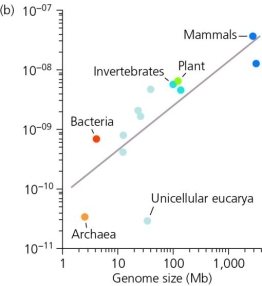Exam 15: Phylogenomics and the Molecular Basis of Adaptation
Under most models for the preservation of duplicated genes that eventually perform new functions,what is the proposed order of events and evolutionary reasoning behind them?
A
How do researchers use gene trees,species trees,and rates of nonsynonymous versus synonymous nucleotide substitution,to explore the evolutionary history of gene families?
By comparing gene trees and species trees,researchers can infer whether specific major duplication events occurred before or after particular species separated into different lineages.This allows researchers to identify the historical timing of gene family evolution and conclude whether the gene family is an ancient or recently evolved phenomenon.Rates of nonsynonymous versus synonymous substitution are used to test for positive selection to infer whether gene family expansion was favored by natural selection.
Briefly describe the three phases included in most evolutionary models for the preservation of duplicate genes,and the evolutionary processes involved.
First,the duplicated gene must rise to fixation (or high frequency)within a population due to drift,because most gene duplication events are initially selectively neutral.Second,one of the duplicate copies acquires a mutation that changes its function.Finally,the new,mutated allele rises to fixation (or high frequency)due to selection favoring the mutated allele with a new function.
[Graders: The final step does not require selection; in principle,the mutated allele could be selectively neutral and rise to fixation due to drift.]
Which of the following most accurately describes the preservation of duplicate genes via the subfunctionalization model?
Which of the following is a TRUE statement about the relationship between RNA interference and mobile genetic elements?
What is the relationship between mobile genetic elements and DNA methylation?
What is a key difference between prokaryote genomes and the genomes of multicellular eukaryotes?
The biologist Michael Lynch has a hypothesis about the role of effective population size in influencing the evolution mutation rates.Describe this hypothesis,with particular attention to the roles of natural selection and genetic drift,and how it can explain the pattern shown in the accompanying figure.

What processes have been hypothesized to influence the evolution of mutation rates?
Laboratory experiments about bacterial mutation rates have demonstrated which of the following?
Briefly describe three key differences between prokaryote genomes and the genomes of multicellular eukaryotes.
Briefly describe the difference between adaptation from new mutation and adaptation from standing genetic variation in natural populations.
Why have gene families evolved? Choose the most accurate answer for gene families in general.
Describe four major patterns in genome structure and function across all groups of organisms as they relate to overall genome size.
Briefly describe the escape from adaptive conflict hypothesis for the preservation of duplicate genes.
Describe how mobile genetic organisms function,how they affect host organisms,and the mechanisms that host organisms possess to interact with mobile genetic elements.
Briefly describe the relationship between DNA methylation,small RNAs (also known as RNA interference),and mobile genetic elements.
Methylation and RNA interference are both involved in regulating mobile genetic elements.Which of the following statements is TRUE?
Can mutation rates evolve in laboratory experiments? Briefly describe an experiment that researchers performed to investigate this,and state whether the mutation rate did evolve,and if so,whether it evolved to become higher or lower.
Immediately following a gene duplication event,what is the most likely evolutionary outcome for a duplicated gene?
Filters
- Essay(0)
- Multiple Choice(0)
- Short Answer(0)
- True False(0)
- Matching(0)